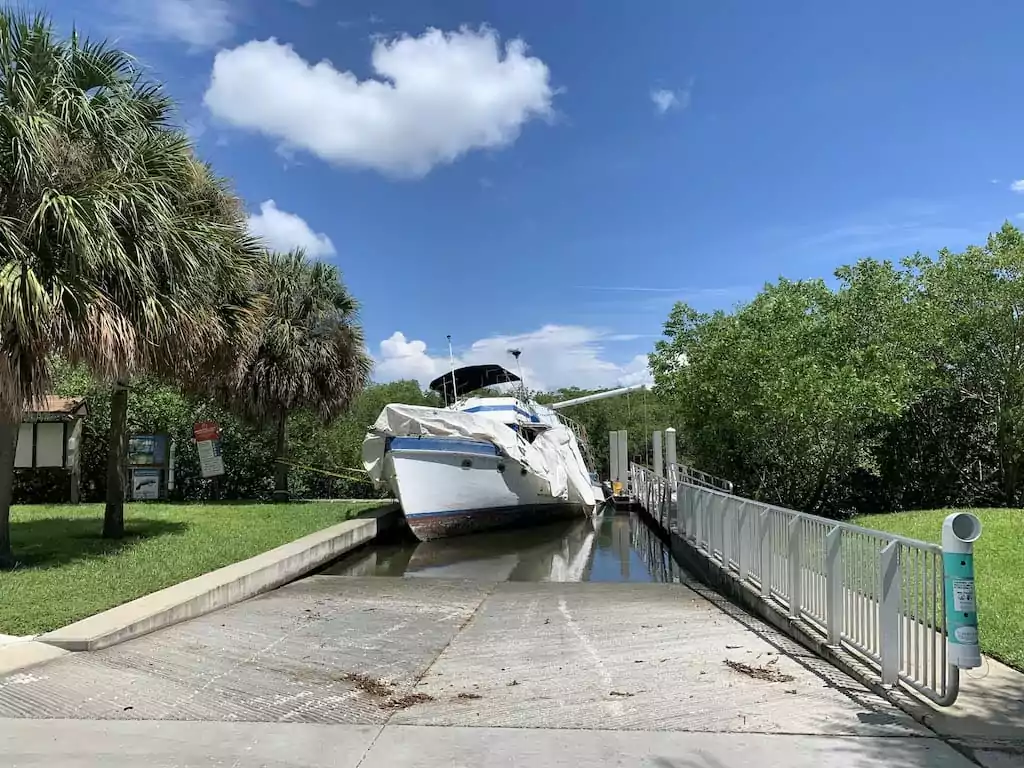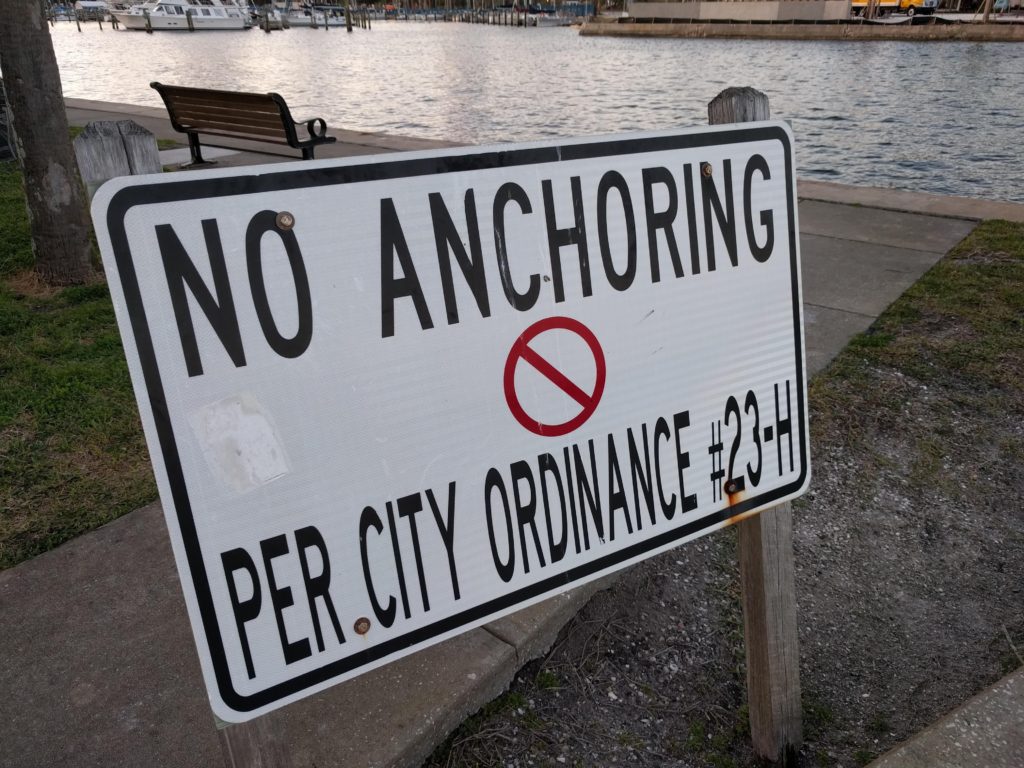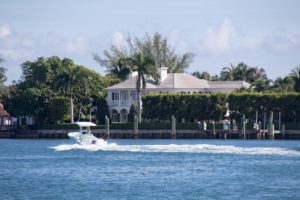Florida Anchoring Laws
Florida anchoring rules have been a toxic, contentious issue for years.
In this article we’ll look at the guidelines, rules and relevant issues facing Florida cruisers.
Plus, for anyone who’s interested, we’ll take a look at some notable Florida anchoring issues and legal cases from the past.
Florida Anchoring Rules: What Do You Need to Know?
- Some rules are state-wide, a few places are local.
- Use this guide, produced by the non-profit Boat US Foundation
- You must be in compliance with the general Florida boating laws!
- There are great resources online, like this boating law guide from FAU
- Anchoring laws change. For the latest updates, check refer to official sources. These resources can also be helpful places to start.
- Florida Boat US page
- The Florida boating legislative report
Cruising Florida Keys: Every Boater’s Dream
Why are Florida anchoring laws such a problem?
I heard someone say one time that “The solution to pollution is dilution”. Well, in Florida, there is a lot of pollution, and not enough dilution.
Florida is a tourist magnet. Year-round tropical weather, gorgeous white sand beaches, swaying palm trees, and clear, turquoise water. To many, it’s paradise.
For all of these reasons, and more, the dream of cruising the Florida Keys is especially irresistible for sailors and boaters.
Cruising boats flock to Florida every winter. Many of those “snowbird” travelers travel from New York to Florida by boat, or elsewhere in the Northeast.
They’re often climate refugees, fleeing harsh, cold and snowy northern winters. Or, they might be doing “The Great Loop”— a popular cruising route that brings boaters from the Great Lakes to the Gulf of Mexico via the ICW, Mississippi river, and then on to Florida’s Gulf Coast and the Florida Keys.
Boating Industry and Tourism
Florida depends on selling beaches, culture, environment and natural resources— especially its waterways—as a luxury destination.
Because of this, Florida’s state and local governments try to maintain a luxurious image. Vagrant boat bums don’t fit that image.
Florida cities have pushed legal boundaries, and sometimes stepped on sandy, flip-flopped toes, to criminalize the act of living on a boat and to discourage those who try.
This fight has been surprisingly drawn out and complicated. It’s received attention at every level of government— local, county, state and Federal.
Care-free endless summer dreams have devolved into toxic debates over obscure Admiralty Law and complex jurisdictional issues.
Anchoring Issues
Florida’s anchoring laws are at the center of conflict. Some coastal cities in Florida have tried to limit the amount of time boats can anchor.
Cities say they’re trying to protect the environment, which is a very legitimate and important issue.

Opponents say the real goal is to prevent people from living aboard their boats. This effort is a problem because anchoring laws generally fall under state and Federal jurisdictions. Anchoring goes hand-in-hand with the right to control navigation and navigable waterways.
Boats and Environmental Protection
Most people are not in favor of anchoring anarchy. There are important problems to address:
- Abandoned boats are environmental disasters waiting to happen
- Sunken and wrecked boats an leak sewage, gasoline, oil, garbage and other pollutants into sensitive waterways
- Fiberglass and its petroleum-based components are immortal pollutants
- Human waste and overboard discharge is illegal, and a big problem
- Disorderly and illegal conduct is, well… illegal
Nobody is advocating for these things, or for bad neighborliness.
Not in My Back Yard

Florida’s economy depends on tourist and boating activities. Even though traveling boaters—cruisers— spend heavily on fuel, dining, etc., they often feel unwelcome in local communities.
Posh waterfront homeowners and developers prefer not to have budget-minded boaters as neighbors.

Many cities view transient boaters as a possible repellant for more spendthrift tourists and high-value waterfront development.
Because of this, communities try to deter liveaboards, every-day boaters and cruisers from anchoring within their city limits.
While cities may have a duty to protect their communities from derelict vessels, pollution and criminals, these are not problems associated solely with people who live aboard their boats.
In fact, one of the worst environmental disasters in Florida— nitrates and red tide— are tied directly to industrial agricultural pollution. But, Big Sugar makes generous campaign contributions; cruisers don’t.
Boater Safety Issues
The implications of anchoring restrictions in Florida are not limited to inconvenienced yachtsmen– anchoring regulations may jeopardize the safety of boaters.
Historically, Admiralty law has recognized anchoring as an integral part of navigation. This recognition is deliberate, and important. Safety on the high seas is inextricably linked to the ability to wait for safe marine weather forecasts.
The safety and well-being of sailors often depends on precise voyage timing, and may not fit into strict seventy-two hour anchoring restrictions, like those enacted by some Florida cities.
Hurricanes, tropical depressions, gales and other emergencies could all extend a sailor’s time in a particular anchorage.
In State v. Frick, a judge ruled against one such seventy-two hour anchoring limit, citing this safety concern as one factor contributing to his decision.
The judge ruled against the “arbitrary time period” (Ankersen, T., Hamann, R., Flagg, B., 2011). This judge recognized that even “innocent” sailors who may not have otherwise intended to break anchoring restrictions may be forced to breach an inflexible law. Such a restriction is not compatible with the capricious nature of the sea (Ankerson, T. et al., 2011).
Similar concerns have been raised among cruisers as well. Sailors know it’s common to be stuck while waiting for parts, or for a good weather window before a voyage.
The judge in Frick found that an imposition of inflexible timetables on sailors could force hasty departures, or other unnecessary safety concessions to meet deadlines (Ankerson, T. et al., 2011).
Living aboard in Clearwater
Unfortunately for recreational mariners, the State of Florida has been inconsistent in ruling against arbitrary anchoring restrictions. In the 2009 case involving State v. Hager, a judge upheld a municipal regulation restricting the rights of vessels who anchor for more than seventy-two hours (Anderson, T. et al. 2011).
The ruling was a setback for those concerned with boater rights and freedom of navigation. In the case, the state ruled that the city of Clearwater was entitled to restrict a man living aboard his vessel because he overstayed a seventy two hour allowance.
In its decision, the court ruled that any vessel which remains anchored for more than seventy-two hours forfeits some rights associated with navigation, and can be deemed a “Live aboard vessel”. Importantly, a “Live aboard” distinction puts boats under the purview of city regulation (Ankerson, T. et al., 2011).
Targeting Transients Unfairly
In addition to disagreeing with safety compromises associated with anchoring restrictions, many cruisers feel that they are unfairly targeted by lawmakers and politicians because of their non-traditional lifestyle choices.
Cruisers are often retirees who live on tight budgets. They might not have permanent roots within Florida to keep them stationary, or to curry political favors from personal networks.
For these reasons, cruisers tend to shy away from legal confrontation, and are unlikely to fight back against governmental abuse.
Because of the freedom afforded by their lifestyles, many cruisers prefer to weigh anchor and find a more hospitable spot than wage a constitutional legal battle for esoteric navigation rights.
Living aboard in Miami
Headaches for people who live aboard their vessels in Florida is not limited to transient voyagers.
In 1986, a woman named Jacqueline Dozier purchased two waterfront lots in Miami, FL and proceeded to live aboard her vessel, which she kept moored in front of her two properties (Dozier v. City of Miami, 2004).
Dozier held a permit from the City of Miami to validate her living situation. A homeowner’s association later objected to Dozier’s living arrangement and had Dozier’s permit revoked by the City of Miami. Dozier appealed the revocation.
Dozier’s appeal was not resolved until 8 years later, when a Florida District Court of Appeal ruled against her in 1994. Even though Dozier wasn’t hurting anybody by using her vessel as a residence, and despite having a city permit to do so, Dozier was drawn into an extended legal battle.
She was eventually forced to relocate her home (2004). The homeowner’s association relied on the following concerns to have Dozier’s permit revoked:
(1) Prevention of potential hazards to navigation
(2) Potential hazard to public health caused by wastewater and other discharges from the live-aboard vessels
(3) The visual obstacle and intrusion live-aboard vessels represent, which they said interfered with the tranquility otherwise enjoyed by neighbors. (Dozier v. City of Miami, 2004)
Dozier put a fight. But, most travelers, cruisers and people who live aboard their sailboats are unwilling or unable to fight back.
Understandably, most would sooner move on to the next anchorage than make a stand for the sake of principle.
Thanks to this conflict aversion, cruising sailors are facing a dwindling number of available free anchorages in Florida.
As their numbers and influence shrink, politicians increasingly view the cruising community as a victim who will accept unfair treatment without a fight.
Many sailors point out a potential perverse incentive that might contribute to additional, unnecessary marine pollution.
As boaters are forced out of safe, protected anchorages where they previously stored their boats they will be forced to relocate to other anchorages which may be less protected and offer less protection from storms, wind and waves.
If boats are concentrated into confined areas it may also contribute to overcrowding issues, which might cause boats to pile up and crash into one another. All of these factors may increase marine pollution if boats sink.
Boat U.S. Fights for Boater Rights
Luckily there at least a few institutions who will fight for boater rights. The community has a small, but vocal network of advocates who continue to fight for boating interests.
Boat U.S. is a prominent provider of recreational boating services ranging from insurance to towing services (Dikinson, E. 2007).
Boat U.S. maintains a sizable lobbying division for both federal and state governments, and is devoted to pursuing boater rights and interests (Dikinson, E. 2007).
Since its founding in 1966, the company has successfully lobbied the Florida State Legislate to enact boater-friendly laws (Dikinson, E., 2007).
Florida boaters celebrated a rare victory over excessive regulation in 2009, when the Florida legislature amended existing boating laws.
The new legislation sought to limit municipal anchoring restrictions and strengthened state regulatory authority.
This change came at the behest of many boater advocacy groups like Boat U.S. and other vocal members of the boating community, who voiced concerns over inconsistent and fragmented city ordinances throughout the state. In 2009, Florida Statute 327.60 was amended to limit municipal control over anchoring (Ankerson, et al., 2011).
The new legislation reserved a greater amount of control over navigation to the State, in order to ensure uniform regulations for boaters.
The revised statute now prevents cities from regulating marine safety equipment, marine sanitation devices, regulating the anchoring practices of “non-liveaboard” vessels outside of mooring fields and other marine related activities in which the state has an interest (FL Statute 327.60). This revamped legislation should help curtail arbitrary anchoring restrictions, although vague language regarding “live-aboard” vessels will surely invite future court battles.
Much controversy over anchoring in Florida stems from jurisdictional disputes. Boaters contend that the act of anchoring is an integral right of navigation, and a matter that should be subject to federal jurisdiction. By this logic, state and local governments would be prevented from imposing regulations that contradict Federal laws.
Boaters favor this interpretation because they desire a uniform set of laws, consistency and to have their rights of navigation protected. Uniformity and the consistent application of law is a primary reason that maritime jurisdiction was reserved to the Federal government in the Constitution, under the Commerce Clause.
If maritime jurisdiction were not relegated to the Federal government, a spattering of fragmented and competing state-level policies might adversely affect interstate commerce. It is unclear whether existing anchoring restrictions in Florida have actually encroached on Federal jurisdiction, but the issue of federal supremacy has been raised in other states.
In 1992, Randal Barber sued the State of Hawaii in federal court (Barber v. State of Hawaii, 1992). In his suit, Barber and his fellow plaintiffs alleged that federally guaranteed navigation rights were being usurped by state regulation. In the suit, Barber et al. challenged “…the constitutionality of all Hawaii regulations and legislation affecting the rights of mariners to anchor and navigate in the ocean waters surrounding the islands of Hawaii” (Barber v. State of Hawaii, 1992).
Specifically in contest was the authority of the State of Hawaii to prevent vessels from anchoring for more than seventy-two hours, and the ability to restrict anchoring to specified locations. The state cited public health concerns and the need to protect various stakeholder interests while defending their regulations (Barber v State of Hawaii, 1992). The federal district court issued summary judgment in favor of the state, a decision which Barber and his fellow plaintiffs appealed.
On appeal, the United States Court of Appeals for the Ninth Circuit also found that the State of Hawaii was within its rights to regulate anchoring within its waters. The court reasoned that state regulations did not overtly burden federal jurisdiction, and that state regulation is not preempted or in conflict with Federal laws (Barber v. State of Hawaii, 1992).
Barber v. Hawaii reinforced a long-standing belief among the courts that except where the Federal Government has a “Compelling interest to the contrary”, states should retain their ability to regulate local anchoring concerns (1992). The court in Barber v. Hawaii recited an opinion dating back to 1858 to justify this decision, noting “…the local authorities have a right to prescribe at what wharf a vessel may lie, and how long she may remain there …, where she may anchor in the harbor and for what time…” (1992).
This case shows that while the Federal Government retains the ultimate power to ensure rights of navigation, it has consistently delegated local anchoring concerns to the states. Further, the case shows that “local regulation of anchoring is not preempted by Federal law” (Barber v. State of Hawaii, 1992). The case of Barber v. Hawaii is often cited in disputes over Florida anchoring laws, and presents a strong case for anchoring regulation at the state level (1992).
Although the Federal Government has consistently shown that it will leave local anchoring regulation to local entities, states are not given carte blanche. The power of the states to regulate anchoring arises partly from the Submerged Lands Act (SLA), in which the Federal Government bestowed ownership of submerged lands to the states (Ankerson et al., 2011). As a condition of this title, states are required to act as trustees and to maintain the submerged lands “for the benefit of the public” (Ankeson et al., 2011). Part of this trustee relationship stipulates that states must preserve the right of navigation for citizens (Ankeson et al., 2011). Since anchoring has consistently been deemed a “right incidental to navigation” (Ankerson et al., 2011), states cannot unreasonably limit anchoring.
To prevent problems the state of Florida should do a better job, and assume a more active role in regulating Florida anchoring anchorage laws. The state should seek input from all stakeholders and employ creative solutions to satisfy various interests.
The state of Florida has already moved in the right direction. Recent legislation has taken control and expressly limited the ability of cities to enact anchoring laws. But, ambiguous language stills leaves room for excessive regulation at the local level. The State of Florida should recognize the economic importance of the boating community, and enact laws which reflect the important relationship.
Anchoring Long-Term Solution: Cooperation
The adversarial relationship between Florida governments and boaters is unfortunate and unnecessary. Recreational boating on Florida’s pristine waterways has been marred by a climate of excessive regulation, abuse of municipal authority and an increasingly fragmented legal structure.
Florida’s environment is a fragile natural resource. No doubt, it needs protection. This protection does not have to come at the expense of responsible boaters. To serve everyone involved, and to sustainably preserve Florida’s waterways, the State of Florida should exert consistent authority over anchoring rights. The state should explore competent solutions to properly manage anchorages, and embrace cruisers and marine tourism in the Sunshine State.
References
State of Florida Constitution: Anchoring Laws
Ankersen, T., Hamann, R., Flagg, B. (3/2011). Anchoring Away.
Barber v. State of Hawai’i, 42 F. 3d 1185 – Court of Appeals, 9th Circuit.
Brown, Issac. (6/28/2004). Cruising World.
Dickinson, Elaine. Cruisers (3/2007). ontest Anchoring Rights. BoatUS Magazine.
Dozier v. City of Miami, 639 So. 2d 167 – Fla: Dist. Court of Appeals, 3rd Dist. 1994.
Florida Fish and Wildlife Conservation Commission. (2009). The Economic Contribution of Registered Boater Spending to the Florida Economy.
Florida Statutes. Section 327.60
This blog post is for entertainment purposes only. It was not written by a lawyer. It is not legal advice. We advise you to consult a licensed, qualified, professional expert.
